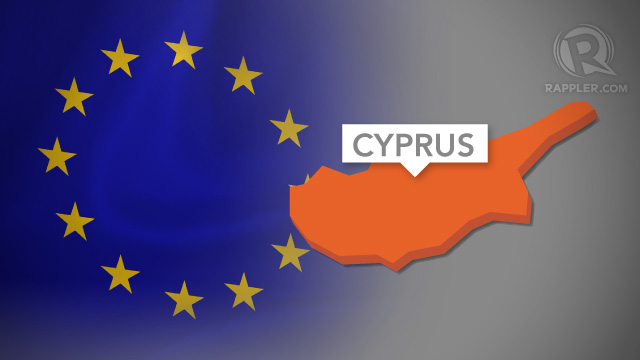SUMMARY
This is AI generated summarization, which may have errors. For context, always refer to the full article.

NICOSIA, Cyprus – Angry MPs on Tuesday, March 19, rejected a divisive levy on bank accounts as part of a bailout aimed at saving Cyprus from bankruptcy, decrying as “blackmail” the EU-IMF deal that now lies in tatters.
Speaker Yiannakis Omirou said 36 MPs voted against the bill, 19 abstained and none were in favor, prompting an explosion of joy outside the parliament among thousands of protesters who were demanding the house spurn the onerous measures.
President Nicos Anastasiades’ office said he “fully respects” the decision and that he had a “constructive” phone conversation with his Russian counterpart Vladimir Putin, amid reports Cyprus was seeking alternative financing.
Under the bailout deal reached at the weekend, the troika of the European Union, European Central Bank and International Monetary Fund were to provide Cyprus with 10 billion euros ($13 billion) on condition the island raises another 5.8 billion euros.
It called for a levy of up to 9.9 percent to be slapped on all Cyprus bank deposits, an unprecedented move that triggered outrage among savers and raised fears other financially crippled EU states like Italy and Spain could be next.
The Cypriot government backtracked, and on Tuesday dropped the proposed tax on savings below 20,000, while keeping it at 6.75 percent for deposits of 20,000-100,000 euros and 9.9 percent for those above 100,000.
But that too was heavily criticized by the speaker as amounting to “blackmail” before it was flatly rejected in parliament, in a vote that plunges the eurozone into uncertainly and leaves Cyprus scrambling for other sources of financing.
Outside the parliament, equally angry crowds had called for a “No” vote before breaking out into applause after the news of the vote emerged.
“We’re happy because the vote is what the people wanted. We are still very anxious but we hope we are going to find an alternative and a solution because it’s clear that Europe is not the solution,” said historian Maria Gnatiou, 27.
Anastasiades’ office said the president “fully respects today’s decision by the House of representatives,” adding he had since spoken to Russia’s Putin and Greek Prime Minister Antonis Samaras.
“At 8:30 pm (1800 GMT) this evening he had a half-hour phone conversation with the president of Russia, Vladimir Putin… they had a constructive conversation about the economic relations of the two countries.”
German Finance Minister Wolfgang Schaeuble said he regretted the parliament’s rejection of the plan.
“We acknowledge and regret the decision… For a rescue plan to exist we need a credible way to know how Cyprus will regain access to financial markets,” said Schaeuble. “For now the debt is too high… it must be reduced.”
The ECB said it would continue to provide financial support for troubled Cypriot banks and a eurozone official said it was now up to Nicosia to come up with “a counter-proposal of equivalent effect”.
Media reports on the island said the government would seek other ways of making up a 5.8 billion-euro shortfall, with a bond issue, bank restructure and trying to secure more Russian investments among the options.
Fearing a run on accounts, Cyprus has shut its banks until at least Thursday, with the island’s stock exchange closed for the same period. Given the latest developments, there was no certainty the institutions would open this week at all.
Before the session, Anastasiades had called an emergency meeting of party leaders for Wednesday morning to “examine alternative plans to address the situation that may arise following… the parliamentary vote”.
A government spokesman said Anastasiades would have further telephone discussions on the terms of the bailout with German Chancellor Angela Merkel later Tuesday, after a first round of talks on Monday.
As the island’s leaders raced to stave off bankruptcy, Finance Minister Michalis Sarris was on his way to Moscow to seek an extension to an existing Russian loan.
Finance ministry director Andreas Charalambous told reporters that securing an extension to the loan was “very important” as it would throw Cyprus a lifeline.
“The first issue is we have a large loan maturing in 2016 and if we manage to come to an understanding this will help facilitate our debt repayments and debt sustainability,” Charalambous said.
“If we manage to extend the loan the refinancing needs of the economy would be manageable. So it’s very important.”
Moscow extended Nicosia a 2.5-billion-euro loan in 2011 at a rate of 4.5 percent.
Sarris’s goal was to lower that rate and extend the loan’s expiration date until 2020 from 2016, reports said. – Rappler.com
Add a comment
How does this make you feel?
There are no comments yet. Add your comment to start the conversation.